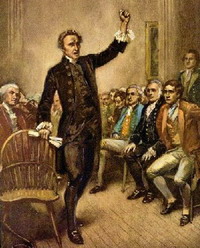Login form
Patrick Henry

“Give me liberty or give me death!” Patrick Henry’s fiery words made him one of the great patriot leaders of the American Revolution.
EARLY LIFE
Born in 1736, Patrick Henry grew up on a tobacco plantation in Virginia. Patrick went to school only for a short time. His father, John Henry, taught him at home.
As a young man, Henry tried storekeeping and farming. He failed at both. Henry then studied law. He earned his license to practice law in 1760. Henry's speaking skills and sharp legal mind made him an outstanding lawyer.
HENRY STEPS INTO POLITICS
In 1765, Virginians elected Henry to the House of Burgesses (the colonial legislature) in Williamsburg. Henry quickly gained fame for opposing a British tax called the Stamp Act.
Henry spoke out against the Stamp Act and compared British king George III to a tyrant. When he did, another legislator accused him of treason. Henry shot back, “If this be treason, make the most of it!” Henry’s statements against the tax echoed throughout the American colonies.
In 1775, Henry urged his fellow Virginians to take up arms against the British. In a speech supporting armed resistance, Henry spoke the now famous words “I know not what course others may take, but as for me, give me liberty, or give me death!”
THE AMERICAN REVOLUTION
In April 1775, British soldiers fought colonists in Lexington, Massachusetts. It was the first clash of the American Revolution. News of the fighting soon reached Virginia. Virginia’s royal governor tried to take the colony’s gunpowder and ammunition supplies for the British. But Henry would not allow it. He gathered the colonial militia, marched on Williamsburg, and forced the governor to return the supplies.
During the American Revolution, Henry served as governor of Virginia. Henry recruited many men from Virginia to fight for the Continental Army. He worked hard to provide soldiers with food, clothing, and ammunition.
After the war ended, Henry was elected to attend the Constitutional Convention in 1787. Henry knew that other people at the convention wanted to create a stronger government for the country. Henry didn’t agree, and he refused to attend.
HENRY AND THE CONSTITUTION
Henry feared that a strong government would threaten people’s freedoms as much as King George III had. In 1788, Henry tried to block Virginia’s approval of the new U.S. Constitution. But the Constitution won approval, anyway.
Henry then supported the adoption of the first ten amendments to the Constitution. Henry believed that these amendments, known as the Bill of Rights, would protect people’s freedoms. After the amendments were adopted, Henry accepted the Constitution.
LATER LIFE
Henry retired from politics in 1790 and continued his law practice. Poor health made him turn down several important government jobs. In 1799, Henry died at his plantation.
Source: Microsoft ® Encarta

